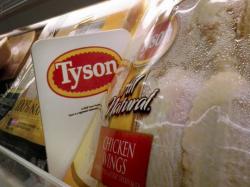Tyson Management Optimistic About Remainder of 2010-11
March 4, 2010 | 3 min to read

SAN FRANCISCO – Speaking at the CLSA AsiaUSA investor conference, Tyson Foods,
Inc. Chief Operating Officer Jim Lochner and Chief Financial Officer Dennis
Leatherby told investors that Tyson has improved its chicken business over the
past year and believe the changes the company has made, along with favorable
market conditions, should bring good returns in the 2010 and 2011 fiscal years.
The key is declining domestic availability of protein, according to Lochner. For
the first time in 40 years, forecasters predict a reduction of available protein
(chicken, beef, pork and turkey) in two consecutive years.
“U.S. per capita consumption is projected down due in part to reduced supplies,
which should mean higher prices,” Lochner said. “Long-term protein supplies are
driven by profitability — or the lack of profitability. Beginning with the
2006-2007 crop, corn and soybean prices became extremely volatile, coupled with
a supply-demand imbalance. Most livestock and poultry producers lost money in
’08 and ’09, which led to cutbacks in the herds and flocks and less protein
available in the marketplace.”
Tyson is well positioned to benefit from these market circumstances. Its Beef,
Pork and Prepared Foods segments are operating well and produced returns above
their normalized operating margin ranges in the first fiscal quarter of 2010.
Although Tyson’s Chicken segment has underperformed in recent years, Lochner and
Leatherby are confident the on-going operational improvements will lead to
long-term success.
“We expect our chicken segment to be in the 5-7% normalized operating margin
range for fiscal 2010,” Leatherby said.
“Strong cash flow has enabled the company to reduce its net debt level
significantly,” Leatherby said. During the first quarter of fiscal 2010 and
through February 5, Tyson used cash and restricted cash on hand on hand to
repurchase and retire $510 million of the company’s debt.
Tyson potentially could bring incremental profitability in the long-term with
renewable products initiatives such as renewable diesel made from non-food grade
fats, greases and oils. Dynamic Fuels, Tyson’s joint venture with Syntroleum,
Inc., is set to open its first plant this summer. Tyson also launched a line of
100% natural premium pet treats under the True Chews(TM) brand in February.
Tyson was able to open its idled plant in Independence, Iowa to produce True
Chews(TM).
Tyson Foods, Inc. /quotes/comstock/13*!tsn/quotes/nls/tsn (TSN 17.47, +0.25,
+1.45%) , founded in 1935 with headquarters in Springdale, Arkansas, is one of
the world’s largest processors and marketers of chicken, beef and pork, the
second-largest food production company in the Fortune 500 and a member of the
S&P 500. The company produces a wide variety of protein-based and prepared food
products and is the recognized market leader in the retail and foodservice
markets it serves. Tyson provides products and services to customers throughout
the United States and more than 90 countries. The company has approximately
117,000 Team Members employed at more than 400 facilities and offices in the
United States and around the world. Through its Core Values, Code of Conduct and
Team Member Bill of Rights, Tyson strives to operate with integrity and trust
and is committed to creating value for its shareholders, customers and Team
Members. The company also strives to be faith-friendly, provide a safe work
environment and serve as stewards of the animals, land and environment entrusted
to it.
Forward Looking Statements
This release includes forward-looking statements as well as historical
information. These forward-looking statements may include statements relating to
the availability of chicken, beef, pork and turkey, the future prices of our
products, projected operating margins, and the performance of Tyson’s renewable
products initiatives. Historical performance is not an indication of, nor does
it guarantee, future results. Factors that could cause actual results to differ
materially from those in the forward-looking statements include, but are not
limited to: consumer demand and perceptions; availability and cost of, and
demand for, raw materials; and the company’s ability to compete in products and
prices in a competitive industry.
Source:
Tyson Foods, Inc.
